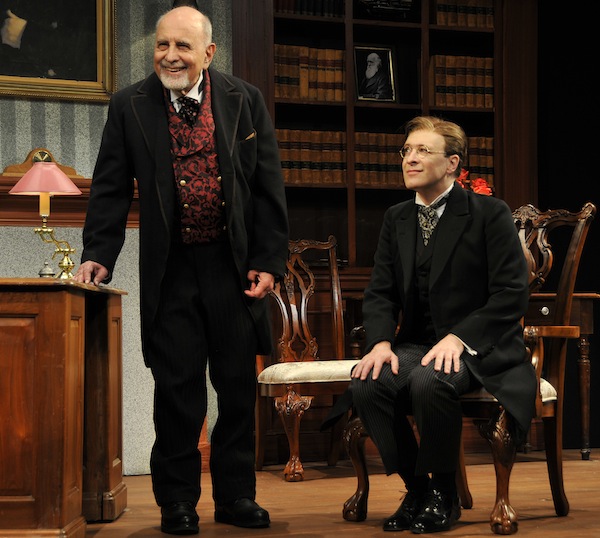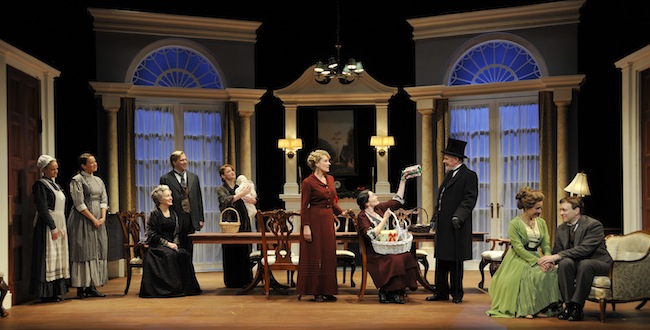Theater Review: “The Voysey Inheritance” — A Masterpiece About Fraud, Capitalism, and Family
The Voysey Inheritance comes to the Peterborough Players with distinction, and this production is persuasive evidence that it belongs in a wider repertory of contemporary theater.
The Voysey Inheritance, by Harley Granville-Barker. Directed and adapted by Gus Kaikkonen. Staged by Peterborough Players, Peterborough, New Hampshire, through August 31.

Mr. Voysey (George Morfogen) and his son, Edward (Kraig Swartz) in “The Voysey Inheritance” at the Peterborough Players. Photo: Deb Porter-Hayes.
By Jim Kates
If George Bernard Shaw is the most frequently produced playwright over the years at the Peterborough Players, this season sees its very first production of The Voysey Inheritance by his too long eclipsed contemporary, Harley Granville-Barker. In fact, what the Peterborough Players are giving us is pretty much the same production that was a smash hit in New York at the turn of the twenty-first century, adapted and directed by Gus Kaikkonen, and with some of the same cast. Although the play is very much of its time, what Kaikkonen has given us is far more than an archaelogical find or an academic curiosity. This Voysey Inheritance is a living contribution to a current repertoire, with a timely theme and compelling dilemmas. It slides easily into an all-too modern world.
After an acting career in the company of Shaw, Granville-Barker wrote The Voysey Inheritance at the turn of the twentieth century, then rewrote it over the next couple of decades through war and financial upheaval. Kaikkonen has collated the different versions almost seamlessly.
The legacy of the title is the kind of financial chicanery we’re used to in our own time. Imagine Bernie Madoff leaving his children with all his pyramid schemes still fully active, intact and virtually undiscovered. Imagine the financial and ethical problems that ensue. There you have The Voysey Inheritance. Full in the face of capitalism, and with a full consciousness of its paradoxes, Granville-Barker asks his characters, and us, to think about “how most money is attained.” Property may be theft, but it’s a real estate that the Voysey family sits on in a landscape made up of the “upper middle” classes.
When the elder Voysey, masterfully acted in his firm and in his infirmity by George Morfogen, shuffles off his mortal coil, he leaves his tangled economic coils to his younger son, Edward, played by Kraig Swartz. In the midst of a family to which and for which he has become responsible, the new head-of-the-household teeters constantly on the edge of hapless catastrophe but equally constantly regains his balance. “You’ve never come face-to-face with any really hard questions,” his father had said to him, and now he does. Chief among the family is his brother Booth Voysey, a major with a parade-ground voice and a domineering manner that Tom Frey conveys well vocally but without a convincingly military physical presence.
Booth is named after George Booth, a friend of the family who has confided his whole fortune to the Voysey management. The pivotal second-act scene, in which George (Michael Page, the Players veteran of indignation) confronts Edward in his office and is confronted in his turn, smacks more of Ibsen (another considerable influence on Granville-Barker) than Shaw in its practical and moral urgency. If this is comedy, it is comedy as deep drama, a mood that prevails through a surprisingly sort-of happy ending.

Christmas time with the Voysey family in “The Voysey Inheritance.” (Emily Reed, Emily Wold, Dee Nelson, Tom Frey, Mary Hannah Dober, Lisa Bostnar, Bridget Beirne, Michael Page, Karron Graves and Kraig Swartz. Photo: Deb Porter-Hayes.
Among the women in the Voysey family, the least well realized in this production is the portrayal by Bridget Beirne of the sister Honor. The figure must appear ridiculous in her extravagance, but in some consistent way that Beirne has not yet thought out. At the moment, it is as if she has accidentally wandered in from outside the family and the play. At the other extreme, Lisa Bostnar, as Booth’s wife Beatrice, is able to manipulate a wine glass in such an agile way that she firmly establishes her character and her position (a balance to the Voysey blood). Also from outside the beleaguered family, Karron Graves provides a sensibly enigmatic romantic foil for Swartz’s Edward; her Alice Maitland puts an interestingly conventional seal on this unconventional comedy of money and ethics.
Tried and true in London and now in New York, The Voysey Inheritance comes to the Peterborough Players with distinction, and this production is persuasive evidence that it belongs in a wider repertory of contemporary theater. But you’re not likely to see it any time soon unless you make the hike to southwestern New Hampshire this week or next. It’s worth the trip.
Jim Kates is a poet, feature journalist and reviewer, literary translator and the president and co-director of Zephyr Press, a non-profit press that focuses on contemporary works in translation from Russia, Eastern Europe and Asia.

Back in 1988 I saw a terrific production of this play at Canada’s Shaw Festival. That convinced me of its enduring power… George Bernard Shaw expressed his admiration this way in 1906: “Mr Granville Barker’s play, The Voysey Inheritance, which shows a mastery that threatens to put us all on the shelf, is a single situation in five acts, maintaining itself for three hours at the pitch that an ordinary ‘constructed’ play attains for about five minutes at the end of the last act but one.”